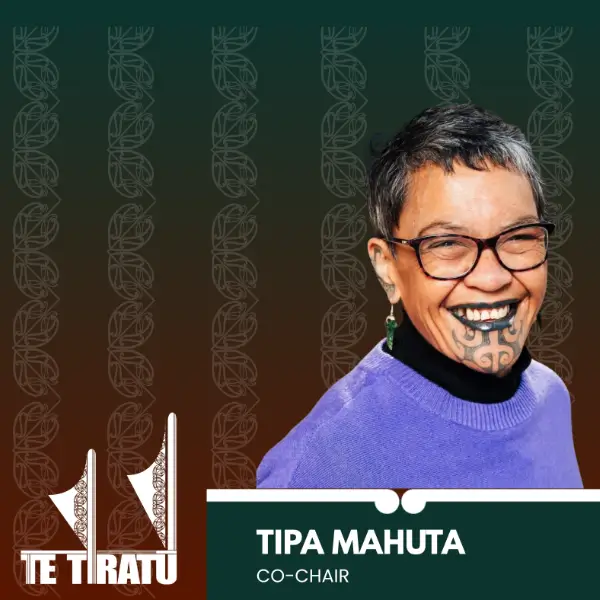Te Tiratū releases first “confronting” monitoring report on health system
MEDIA STATEMENT
FOR IMMEDIATE RELEASE
Friday 27 June 2025, 6:00 PM
2 minutes to Read
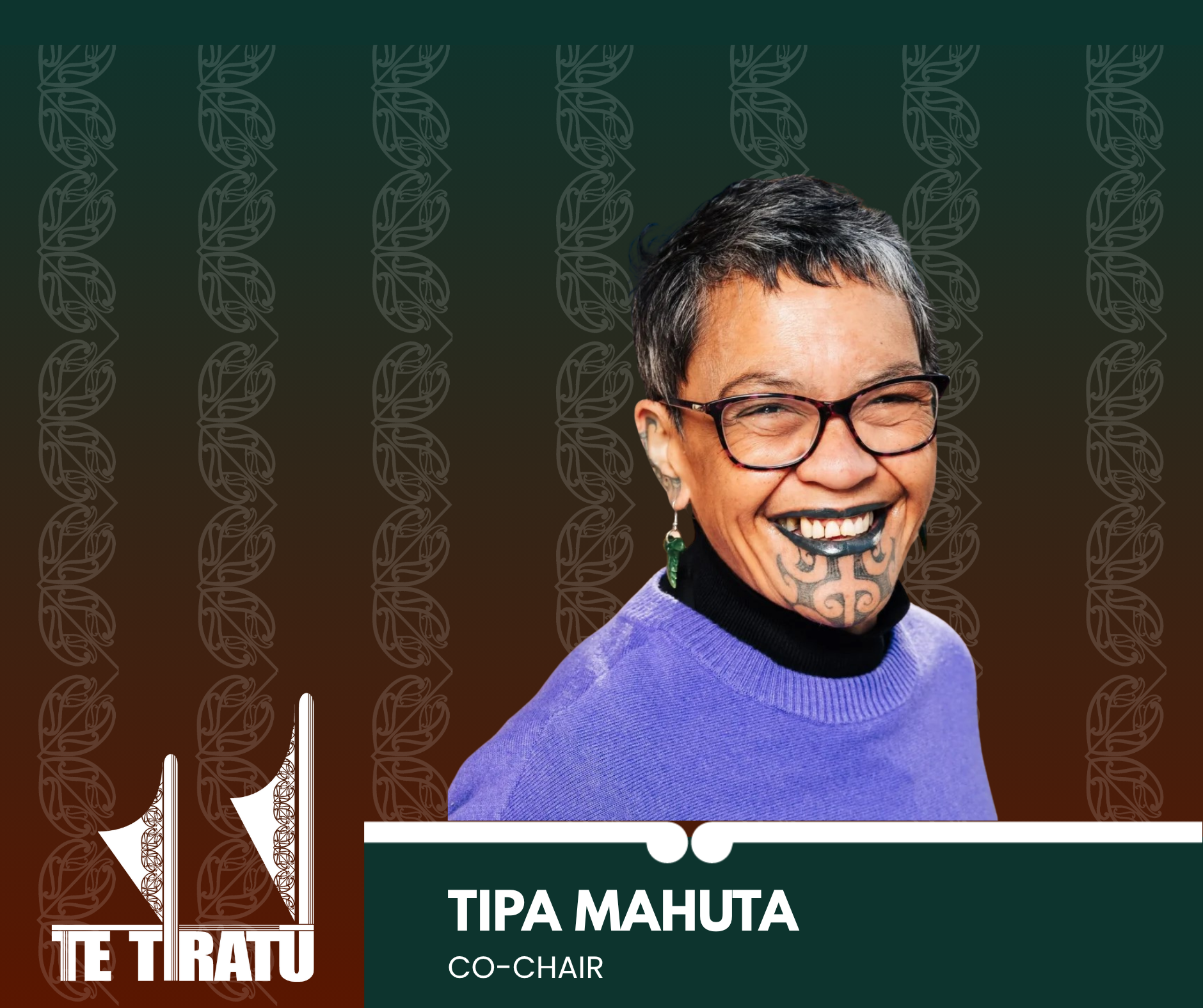
Te Tiratū Iwi Māori Partnership Board has released its inaugural Monitoring Report — a 46-page document under Section 30(1) of the Pae Ora Act 2022 that holds a mirror up to the system and asks two urgent questions: Is it working for us? And is it honouring Te Tiriti o Waitangi?
“This isn’t just data,” says Te Tiratū Co-Chair Tipa Mahuta. “It’s a reflection of what our whānau are actually living through every day — and it’s hurting them. The gap between policy promises and real-life outcomes is still too wide. Te Tiriti o Waitangi must be upheld in practice, it’s not a nice to do – it’s a must do.”
“Top of mind for our Board is the toll of cardiovascular, respiratory, and renal disease on our people which is simply devastating. Too many of our whānau are dying from preventable conditions — on average, seven years earlier than anyone else in the country.”
Representing 114,000 whānau across the Tainui waka rohe, Te Tiratū has drawn on lived experience from Whānau Voice surveying in the community, very limited data from Te Whatu Ora Health New Zealand, and legislative benchmarks to track system performance— and the findings are both sobering and clear – equity remains out of reach for too many Māori.
The report evaluates how well the system is delivering based on Te Tiratū’s regional health priorities, the five Government health targets, and Te Whatu Ora Health New Zealand’s statutory obligations under the Pae Ora (Healthy Futures) Act 2022.
It arrives at a pivotal time, as the Crown signals more major changes — including proposed amendments to Pae Ora after the disestablishment of Te Aka Whai Ora Māori Health Authority in its first 100 days.
“What we found in the report is confronting. Despite isolated gains — such as in mental health and addiction services — inequity remains entrenched. Our whānau continue to face multiple barriers to care, including cost, distance, culturally unsafe services, and long wait times,” said Mahuta.
Cancer screening rates for Māori remain far below national targets, and many Māori are missing out on essential primary care. Data is either missing or incomplete across key health areas like immunisation, oral health and long-term conditions — making it nearly impossible to track improvements or hold the system accountable.
The report also highlights that Te Whatu Ora Health New Zealand is falling short on many of its Pae Ora legislative obligations. Authentic iwi partnership in governance and decision-making is minimal or missing altogether.
Hauora Māori providers, while delivering high-trust, culturally grounded services, remain constrained by funding inequities and fragmented, siloed contracting systems.
Te Tiratū has sent the monitoring report to both Te Whatu Ora Health New Zealand and the Hauora Māori Advisory Committee and invited them to use the findings to shape advice to Minister Brown on investment, governance, and policy affecting Māori.
“We’ve seen what’s possible when whānau are listened to and resourced properly — particularly in areas like renewing the successful childhood immunisation programme run by Māori providers,” Mahuta said.
“Now we need to scale that success. We remain committed to advocating for a health system that is fair, accessible, and equitable — one that reflects the rights, needs and aspirations of our people.”
BUDGET 2025: Te Tiratū Iwi Māori Partnership Board: Uncompromising call to Govt on Budget 2025
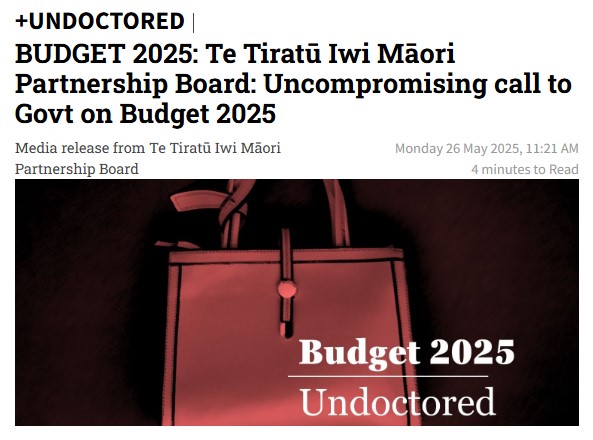
The Te Tiratū Iwi Māori Partnership Board, the statutory voice for 114,000 whānau Māori across the central North Island, is issuing an uncompromising call to the Government: make Budget 2025 a decisive turning point so the health system is timely and accessible.
Data showing alarmingly low immunisation rates, delays, costs still undermining Māori Health
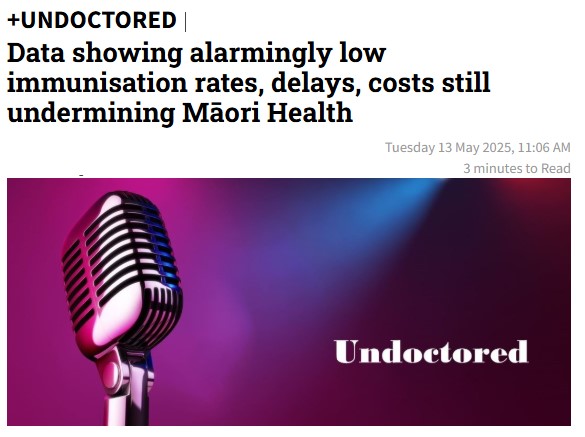
Te Tiratū Iwi Māori Partnership Board April Whānau Voice Report mirrored by Te Whatu Ora data has evidenced immunisation rates 33% lower than the national average, widespread inequities, long wait times, and unaffordable care still plaguing whānau Māori in its Tainui waka rohe.
Data showing alarmingly low Immunisation rates, delays, costs still undermining Māori health
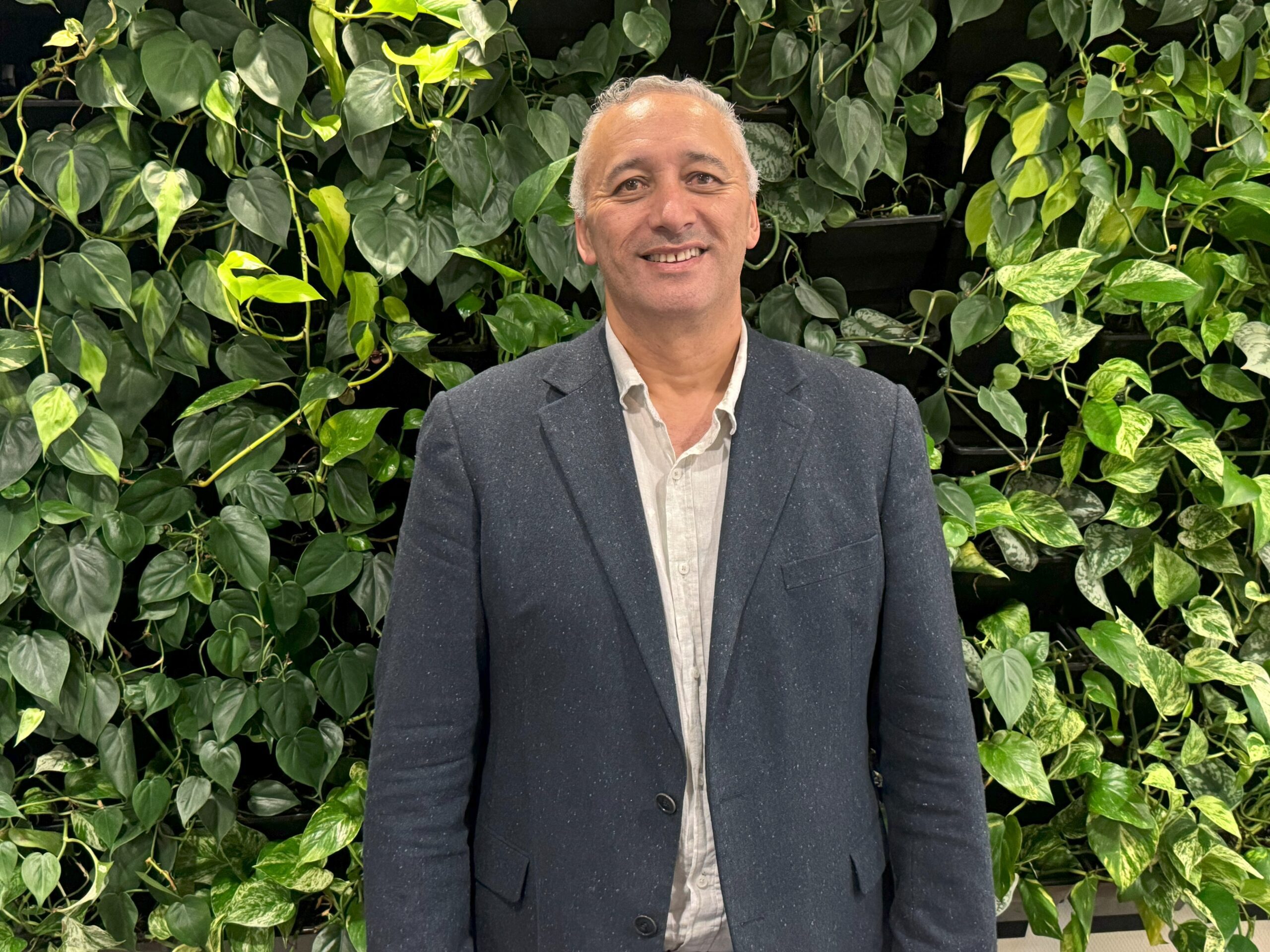
Photo: Co-chair of Te Tiratū Iwi Māori Partnership Board Hagen Tautari
Te Tiratū Iwi Māori Partnership Board April Whānau Voice Report mirrored by Te Whatu Ora data has evidenced immunisation rates 33% lower than the national average, widespread inequities, long wait times, and unaffordable care still plaguing whānau Māori in its Tainui waka rohe.
The Board, which holds legislative responsibilities under the Pae Ora (Healthy Futures) Act 2022 to represent Māori voices in health and monitor health system delivery of Te Whatu Ora, gathered lived experiences from 53 whānau across its rohe.
Behind every statistic is a whānau member struggling in silence.
The April Whānau Voice report revealed:
- 23% of whānau identified access to care—like GP appointments or surgeries—as their biggest barrier.
- 27% said cost was the major obstacle, forcing choices between essentials like kai and medication.
- 14% highlighted the need for more culturally safe, Māori-led care.
“Whānau are still waiting—too long—for care that should be timely and accessible,” said Hagen Tautari, co-chair of Te Tiratū Iwi Māori Partnership Board.
“One kuia told us her husband had life-saving heart surgery, but no specialist follow-up for almost a year. Another Māmā has waited two years for her child’s ear operation. These are not exceptions—they are systemic failures.”
Whānau are being left to manage complex conditions like diabetes, cancer, and heart disease with minimal support. Many avoid primary care due to cost and instead turn to overburdened emergency departments—even for non-urgent issues.
“We go to hospital because there’s nowhere else,” said another whānau.
In rural areas, lack of transport compounds the problem. Some whānau reported sitting in shuttle vans for hours to access basic services. Others gave up entirely.
Cultural safety also emerged as a major issue for whānau, ironically at a time when the government is looking to proactively remove cultural requirements from workforce regulation.
While Māori health workers were praised for their manaakitanga, whānau shared painful stories of clinical encounters with the non-indigenous workforce that lacked empathy, understanding, or cultural connection.
“We need more Māori nurses and doctors,” said one whānau. “They didn’t just treat us—they respected us.” But the report goes beyond what’s broken. Whānau were clear about what needs to change.
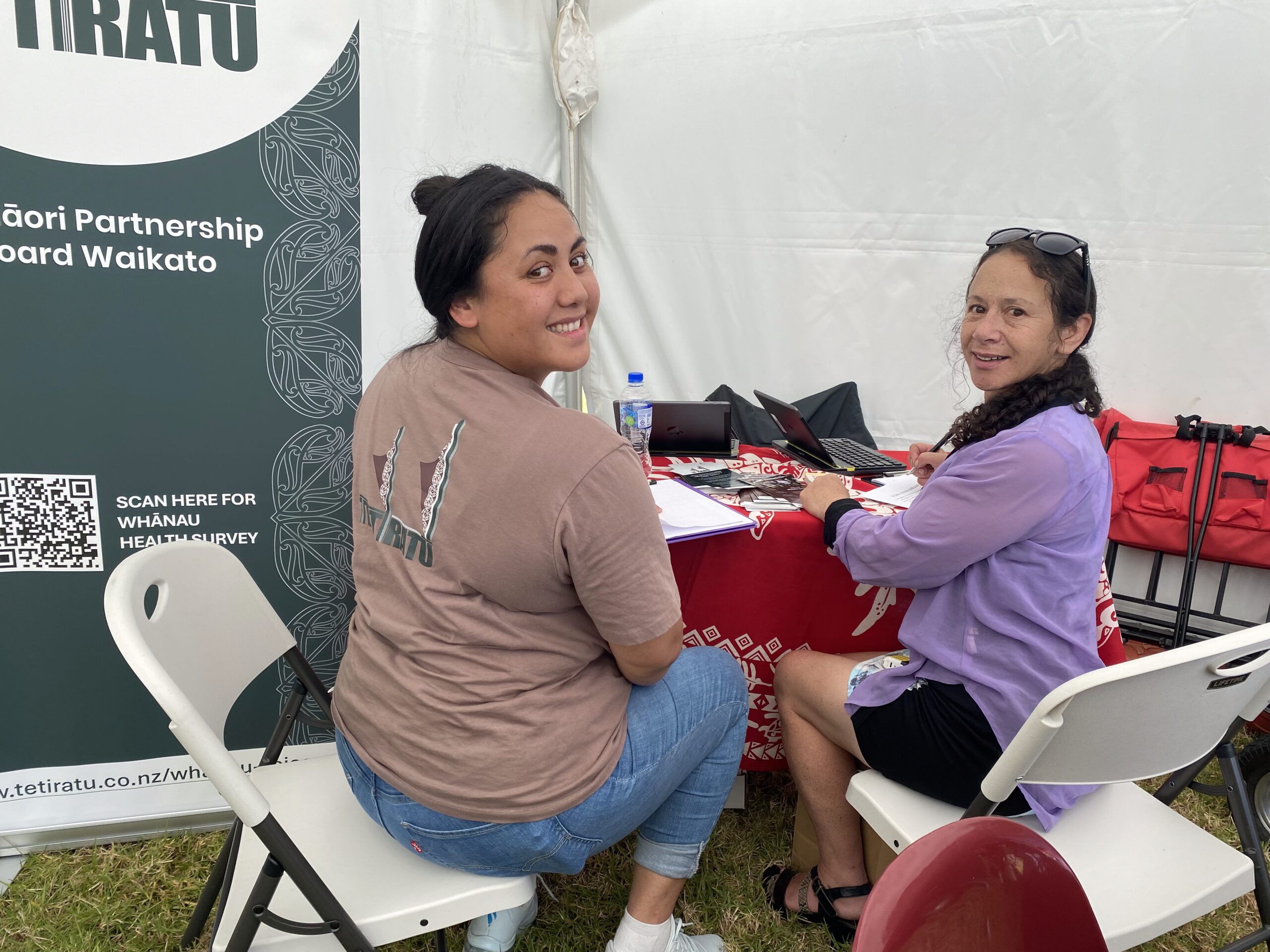
Photo: Raven Torea Whānau Voice kaimahi, of Te Tiratū Iwi Māori Partnership Board receiving whānau whakaaro
Priorities included:
- More doctors, more appointments, and reduced wait times (24%)
- Lower costs for basic care (27%)
- Improved transport and localised services (14%)
- More culturally grounded, Māori-led health care (14%)
- Better coordination between health services (13%)
- Holistic, whānau-centred support for housing, income, and wellbeing (10%)
Data from Te Whatu Ora for Waikato as at 31 December 2024 reinforces these concerns:
- HPV Vaccination rates for Māori aged 14 are only 46%, far from where they need to be to prevent sexually transmitted diseases and cervical cancer.
- Tamariki immunisation rates under 24 months are alarmingly low at 62%, well below the 95% national target, increasing the risk of preventable disease outbreaks.
- Emergency Department wait times are unacceptable: 27% of Māori wait over 6 hours before being admitted, transferred, or discharged—placing undue stress on kaumatua, māmā, and tamariki.
- For elective surgery, only 65% of Māori receive timely treatment, compared to 71% of Non-Māori—leaving 35% waiting over four months.
- Cancer screening rates are critically low:
- Bowel screening: only 46% for Māori aged 60–74
- Breast screening: 55% for wāhine aged 45–69
- Cervical screening: 58% for wāhine aged 25–69
- Cancer treatment within the 31-day target is met for only 62% of Māori, far below the 90% national goal.
“These numbers are not just data points—they’re warnings,” said Tautari. “They tell us that inequity is embedded and urgent.”
“Our care needs to reflect our world. Te ao Māori matters in healing,” one whānau member said in the Whānau Voice report.
Te Tiratū says the April report and supporting health data are a wake-up call to decision-makers across the motu. The stories and statistics are not just feedback—they are a call to action.
“We carry both a legal and moral obligation to ensure whānau voices are not only heard, but acted upon,” Tautari said.
“System change begins when we honour the truths our whānau are brave enough to share and cultivate service delivery grounded in manaakitanga, equity, and tino rangatiratanga.”
Regulators removing health workforce cultural safety risks clinical safety - It’s time to double down
Te Tiratū Iwi Māori Partnership Board is calling on health regulators to immediately reject any proposal to remove cultural requirements from the regulation of healthcare professionals, saying such a move would be “irresponsible, inequitable, and dangerous.”
It is responding to the current Ministry of Health online survey Putting Patients First: Modernising health workforce regulation that closes just before midnight. One of the survey questions tests whether regulators should focus on factors beyond clinical safety — such as mandating cultural requirements.
Te Tiratū, which represents 114,000 whānau Māori of the Tainui waka rohe, has submitted a formal response opposing the proposal to remove cultural requirements from regulation.
The submission, Response to Proposal to Remove Cultural Requirements from Regulation was prepared by Board member Dr Mataroria Lyndon (MBChB, MPH, PhD), a Senior Lecturer in Medical Education at the University of Auckland, where he trains health professionals in cultural safety.
Dr Lyndon emphasises that cultural safety is not an optional extra — “You cannot have clinically safe care without culturally safe care. Cultural safety is not a parallel concern to clinical standards; it is foundational to them,” he said.
“Removing cultural requirements from regulation can compromise quality of care, deepen inequities, and breach our rights as tangata whenua under Te Tiriti o Waitangi.
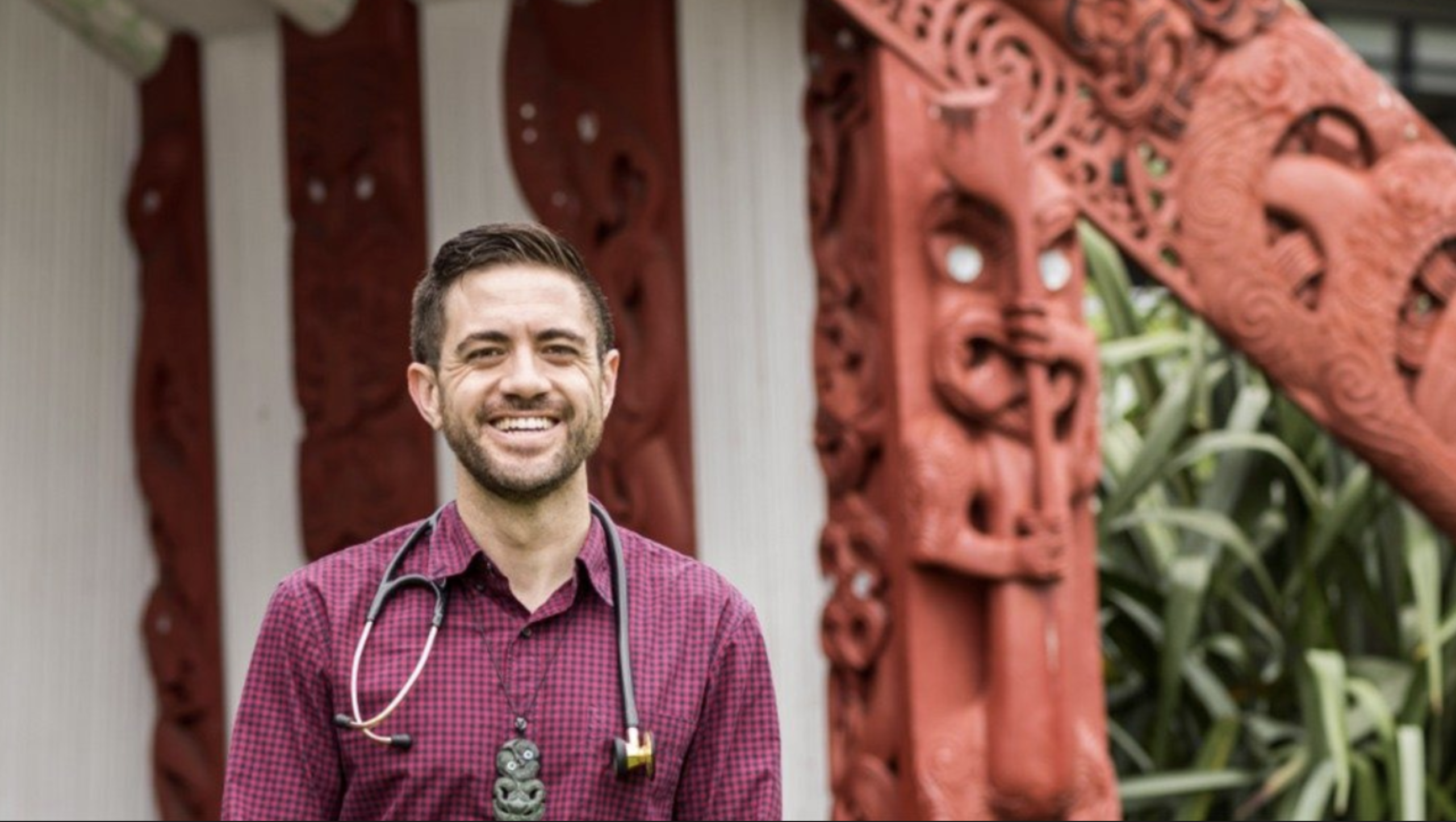
Photo: Dr Mataroria Lyndon (MBChB, MPH, PhD) member of Te Tiratū Iwi Māori Partnership Board
“When patients don’t feel culturally safe, they may not share pertinent health information, and as a result diagnosis, treatment, and trust can all suffer. Cultural safety isn’t just about respecting cultural values — it’s about improving health outcomes, clinical quality, and patient wellbeing.”
Te Tiratū fully backs this position. Without cultural safety, patients may not feel comfortable disclosing vital information or engaging with treatment plans — all of which undermines clinical outcomes.
Cultural safety empowers patients — not providers — to define what ‘safety’ means in their care. Without it, patients, especially Māori and other marginalised communities such as takatāpui (LGBTQI+) and tāngata whaikaha (disabled) whānau, face disengagement, reduced access to services, and poorer health outcomes.
The Council for Medical Colleges’ Cultural Safety Training Plan, developed in partnership with Te ORA (Te Ohu Rata o Aotearoa Māori Medical Practitioners), outlines how cultural safety must be embedded across training, clinical practice, governance, and at a systems level.
Its principles are widely recognised by national health bodies, including the Australian Medical Council and Royal Australasian College of Physicians, which link cultural safety directly to clinical and patient safety.
“Culturally unsafe care is unsafe clinical care,” said Dr Lyndon. “To remove these requirements would not only wind back decades of progress toward health equity — it would expose our communities to poorer quality care.”
Research shows that cultural safety is an important pathway to health equity, supporting respectful and accountable engagement between practitioners and communities.
It enables clinicians to work more effectively with Māori whānau by recognising and countering bias, racism, and harmful stereotypes — all of which contribute to more positive patient experiences in the health system.
In September 2024, as part of its legislated functions under the Pae Ora (Healthy Futures) Act 2022, Te Tiratū delivered its Priorities Report to the government, which emphasised the importance of culturally responsive care.[1]
In a separate Community Health Plan also handed to the Deputy Chief Executive of Te Manawa Taki region and senior officials, Te Tiratū reinforced the need for high-quality, community-led, culturally safe healthcare across the Te Tiratū rohe. [2]
Even the government’s own Te Pae Tata Interim New Zealand Health Plan reaffirms the importance of cultural safety training for the Te Whatu Ora workforce.[3]
“These are not new ideas — they are community-driven imperatives and government-endorsed priorities,” said Dr Lyndon. “Contemplating removing cultural requirements from professional regulation flies in the face of both.”
“It’s about ensuring our patients, whānau, and communities are seen, heard, and treated with dignity. Cultural safety is a critical lever to transform the system and structures that continue to disadvantage Māori who on average die between seven and nine years earlier than the general population.”
He points to the recommendations in the groundbreaking 2019 Hauora Report from the WAI 2575 Health Services and Outcomes Kaupapa Inquiry, which affirms the Crown’s binding obligation to ensure Māori have access to culturally appropriate healthcare.
“We are urging all regulators to uphold their obligations to Māori under Te Tiriti o Waitangi and to Aotearoa’s wider commitment to equitable, patient-centred care.”
“This is not the time to retreat — it’s time to double down on cultural safety, for the benefit of all.”
Sources:
[1] Pg23 https://tetiratu.co.nz/wp-content/uploads/2024/10/Te-Tiratu_Hauora-Maori-Priorities-Summary-Report_FINAL.pdf
[2] Pg 6,8,11 https://tetiratu.co.nz/wp-content/uploads/2025/02/Te-Tiratu-IMPB_Community-Health-Plan_FINAL-updated.pdf
[3] Pg15 https://www.tewhatuora.govt.nz/publications/te-pae-tata-interim-new-zealand-health-plan-2022
Bringing the smile back to Taumarunui: Dental care in the spotlight at Hapori Hauora Day
Crowds of whānau gathered today in Taumaranui at the Hapori Hauora Day, a health and wellbeing event designed to connect them with much-needed services—especially those that have been out of reach for too long, including oral health care.
Hosted at Taumarunui Hospital, the event organised by local and Te Whatu Ora services was supported by Te Tiratū Iwi Māori Partnership Board (IMPB) with its dedicated Whānau Voice kaimahi, and it drew attention to the stark gaps in health access across the region—particularly in the areas of dental, eye and ear care.
The Hauora Day provided on-the-spot services that included cardiac/diabetes/cancer screening, an eye clinic, immunisations, gall bladder/hernia/haemorrhoid banding specialists, to skin lesion clinics, but judging by the queues it was oral health and access to dental care that emerged as a top priority for many whānau attending.
“Parents expressed deep concern to get their tamariki seen—lining up in long queues to get access to the visiting dental teams. Yet the cost of treating their own dental issues remains out of reach. Many whānau do the best they can, using services when they’re available—but essential health care shouldn’t come down to waiting in line on a hauora day. That’s not equity—that’s survival,” said Brandi Hudson, Te Tumu Whakarae of Te Tiratū Iwi Māori Partnership Board.
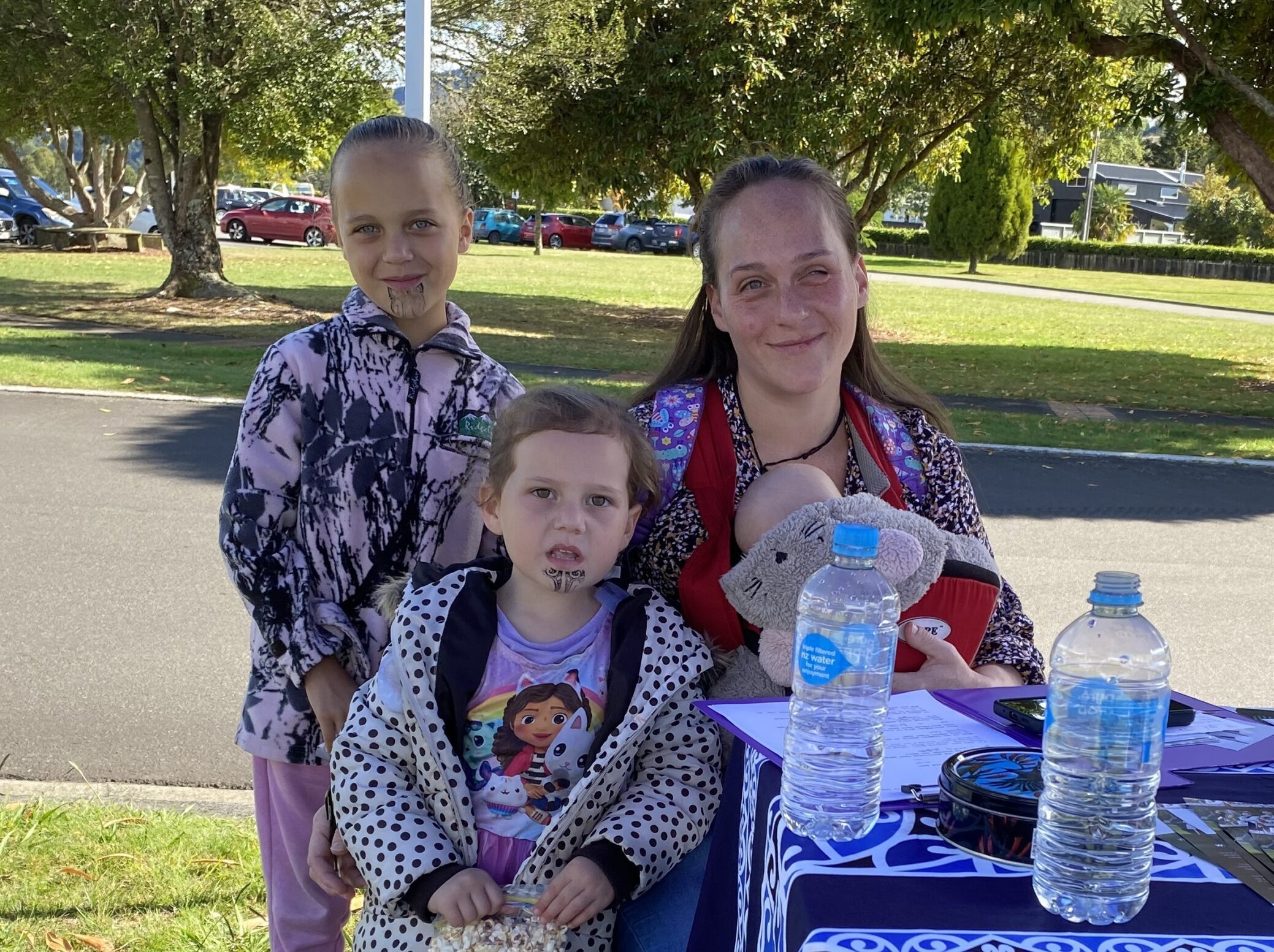
A Call for Regular, Mobile Dental Services
Te Tiratū is advocating strongly for regular mobile dental services to visit remote and rural communities in South Waikato, where many whānau face significant barriers just getting to appointments—if they can find one. With few local dentists, high costs, and long travel times to urban centres, oral health has become a silent crisis.
Why Dental Matters
Oral health doesn’t exist in isolation. Poor dental care can lead to chronic infections, impact nutrition, self-confidence, and is closely linked to other health conditions like diabetes and heart disease. The Hapori Hauora Day included oral health education sessions, helping whānau understand these links and encouraging prevention. But education alone isn’t enough.
Pregnancy also increases the risk of dental issues, and with a high number of young Māori mothers and half the population under 25, the need for regular, accessible dental services is urgent and growing.
Looking Ahead: Growing a Māori Dental Workforce
The solution lies not just in service delivery—but in workforce development. Māori dental hygienists, therapists, and dentists are among the fastest-growing sectors in the health workforce, and the Te Tiratu wants to see that reflected in local service planning.
“Investing in our own people to deliver culturally grounded, community-based care is essential,” said Brandi Hudson. “And that starts with visibility. When our tamariki see Māori dentists in our communities, they start believing it’s a pathway for them too.”
Te Tiratū Iwi Māori Partnership Board hosts inaugural forum with Waikato health providers
Today marks a pivotal milestone for Māori health in the Waikato as the Te Tiratū Iwi Māori Partnership Board (IMPB) holds its first-ever forum with specific regional health providers both mainstream and Māori.
It has brought together those specifically focussed in the area of primary care and cancer to align with current reporting topics that Te Tiratū is canvassing in the community.
The hui is a vital step in realising the aspirations of the Pae Ora (Healthy Futures) Act, which mandates IMPBs to bring the voices of whānau directly into the heart of Te Whatu Ora Health New Zealand planning and decision-making.
At the heart of the discussions are insights gathered through the Whānau Voice initiative — a culturally grounded approach led by Te Tiratū kaimahi using surveys, hui, kanohi ki te kanohi kōrero, and existing research and data.
This powerful community feedback tool paints a sobering picture of the current health landscape for Māori in Waikato.
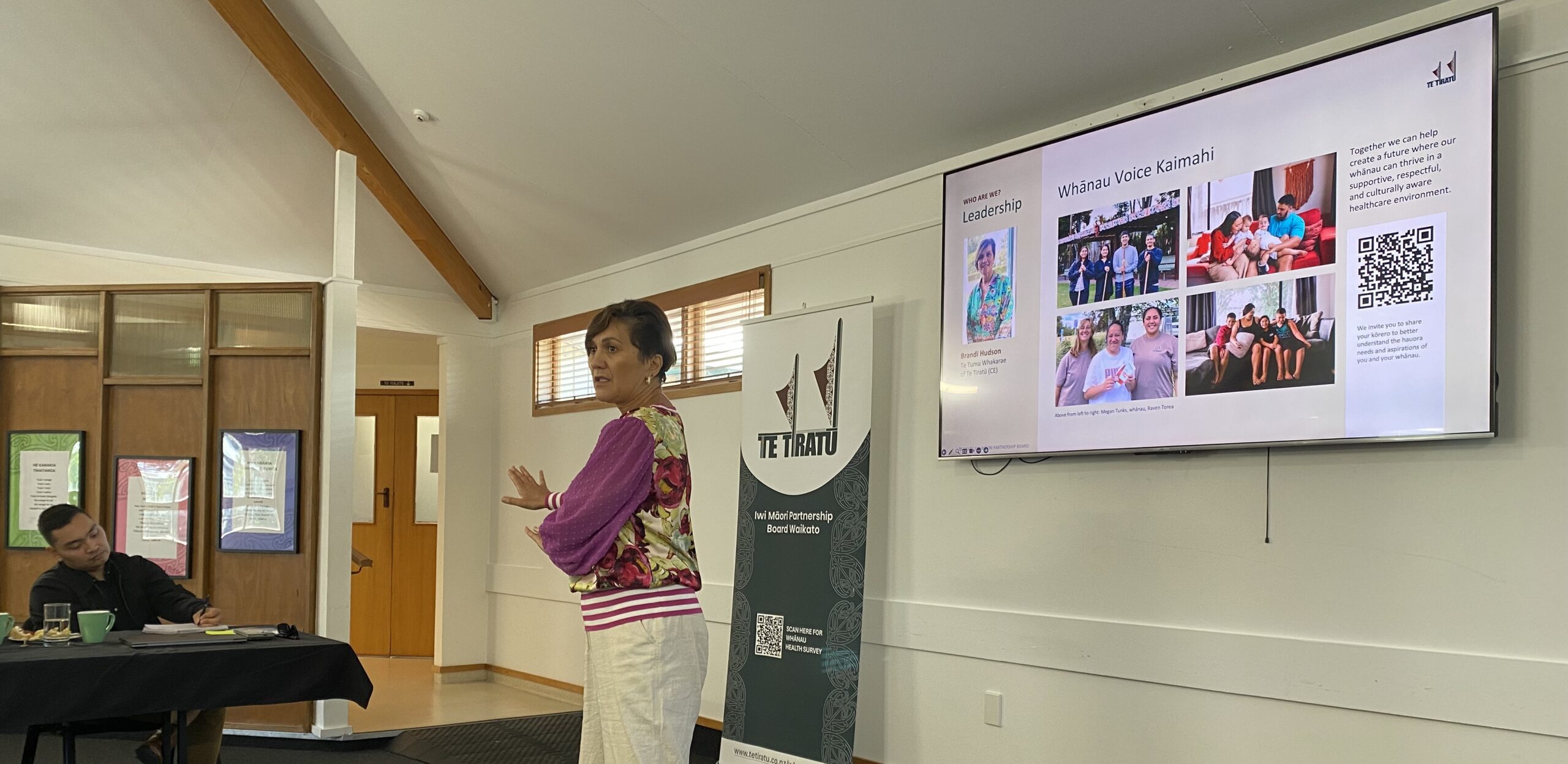
Photo: Te Tiratū Tumu Whakarae, Brandi Hudson presenting to the providers.
Key Challenges Raised by Whānau Voice:
Access & Availability
-
- Long wait times for appointments.
- Shortage of Māori-led, tamariki-focused, and mental health services.
- Disrupted continuity in GP care and low trust in the system.
- Health Navigation
- Strong call for more health and whānau navigators.
- Confusion around available services and support pathways.
- Lack of follow-up and poor communication post-diagnosis.
- Cancer Journeys
- Late diagnoses, particularly lung and prostate cancers.
- Emotional and financial strain on kaumātua caregivers.
- Gaps in transport, spiritual care, and access to rongoā Māori.
- System Gaps
- Fragmented care and poor integration between hospitals, PHOs, and services.
- Limited awareness of entitlements like travel support and Cancer Society aid.
“These stories are a clear call to action,” says Brandi Hudson, Te Tumu Whakarae of Te Tiratū.
“Whānau are asking for a system that listens, responds, and restores trust. Today’s forum is a first step in reshaping that system together with these providers who understand the lived realities of our people.”
“It’s only the start as we intend to proactively meet with many diverse stakeholders in the system operating in our regional area – Māori providers, mainstream providers, NGOs – to zero in on specific areas of interest we’re monitoring.”
Demographic Realities Driving the Urgency:
The Te Tiratū region has a youthful and growing Māori population, projected to rise from 25% in 2023 to 29% by 2043. Nearly half (48%) of Māori are under 25, demanding proactive and youth-focused planning.
At the same time, the Māori population aged 65+ is set to grow by 40% by 2043, increasing the need for age-friendly, culturally safe services for kaumātua and kuia — who already face greater financial barriers to care than their non-Māori counterparts.
Health Priorities Set by Te Tiratū IMPB:
As part of its Community Health Plan, Te Tiratū has tabled three immediate priorities with Te Whatu Ora:
- Pepe and Māmā – First 100 Days
- Māori infants face 1.5x higher rates of avoidable hospital admissions and are almost twice as likely to die as non-Māori infants.
- Hauora Hinengaro – Mental Wellbeing
- Psychological distress among Māori adults is climbing (from 11% to 18%), with 18% of the region’s 47,000 mental health-related GP visits involving Māori.
- Ngā Kaumātua me Ngā Kuia – Elders’ Health Equity
- While older Māori may delay care less frequently, they report more hardship accessing services than non-Māori peers.
Today’s forum is the first of many to come facilitated by Te Tiratū IMPB uniting health system stakeholders to explore and respond to the latest Whānau Voice insights.
“Whānau Voice is not just a report — it’s a relationship,” says Hudson.
“The insights shared come from trust built kanohi ki te kanohi. That’s what our health system needs more of: trust, connection, and commitment to Māori solutions.”
Largest iwi Māori partnership board calls for Māori-focused equity in access
Te Tiratū Iwi Māori Partnership Board that serves 114,000 Māori in the Waikato rohe welcomes the Government’s decision to lower the eligibility age for free bowel cancer screening from 60 to 58 announced today.
“Screening is an essential tool for prevention and early detection, and expanding access will definitely save lives,” said Hagen Tautari, co-chair Te Tiratū Iwi Māori Partnership Board.
“However, what we don’t want is to leave our people who are high-risk behind as they face substantially poorer health outcomes. What we need is an easier diagnostic process that removes systemic barriers.”
Published tested evidence shows that Māori are twice as likely to die from all types of cancer compared to non-Māori.
Research shows the rate of colorectal cancer diagnoses among young Māori under 50 years has increased by an average of 36 percent per decade.
In the rohe Te Tiratū operates Māori cancer numbers are some of the highest in the country.
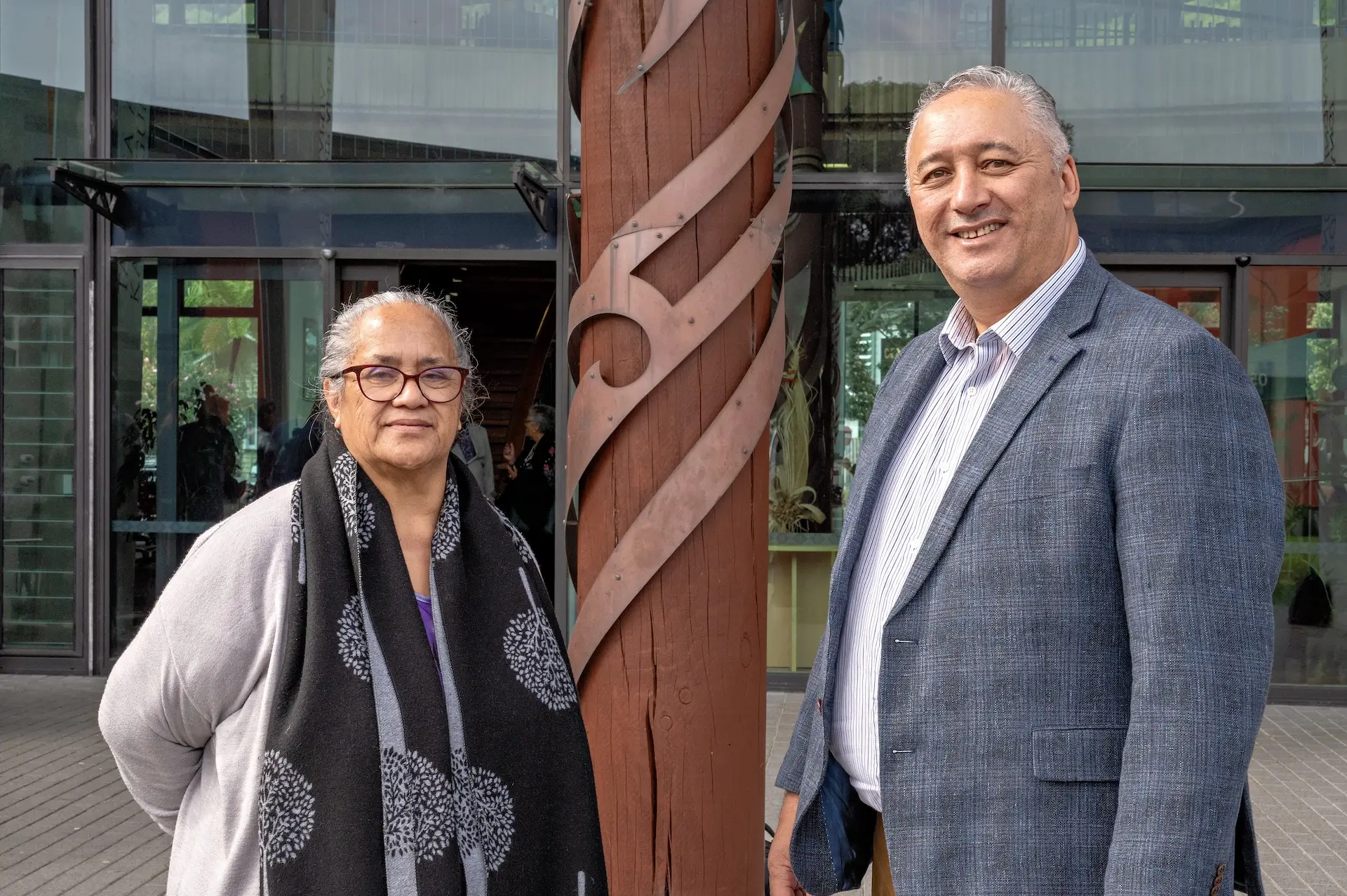
Photo: Co-chairs of Te Tiratū Iwi Māori Partnership Board Kataraina Hodge and Hagen Tautari
While Māori continue to face grave Māori health inequities and significantly lower cancer screening rates, Te Tiratū prioritises prevention as a fundamental step toward improving outcomes.
This adjustment in funding, which moves away from a previously targeted approach for Māori and Pacific communities discontinued in December, raises concerns about whether the expansion will effectively reach and benefit those most at risk.
Pae Tū, the Hauora Māori Strategy is currently being redesigned, following extensive public consultation. Te Tiratū expects it will reflect the needs and expectations of the region to better address the specific needs of Māori and ensure more effective, equitable health outcomes – access to screening being one of them.
Te Tiratū advocates strongly that cancer screening must be culturally appropriate and properly resourced to ensure Māori participation over a lifetime.
It acknowledges that the solutions lie in true partnership between the community and Te Whatu Ora. A prime example is the Taakiri Tuu Wellness and Diagnostic Centre, established in 2024 by Māori health provider Te Kōhao Health in a high-deprivation area, specifically designed to serve whānau Māori.
Kataraina Hodge, co-chair of Te Tiratū Iwi Māori Partnership Board, believes that without targeted strategies, partnerships in community and resourcing for high need populations existing disparities could be reinforced rather than reduced.
Te Tiratū Iwi Māori Partnership Board invites clear commitments by Te Whatu Ora to support:
• Resourcing Māori-led, community-driven promotion of screening.
• Accessible screening locations, particularly in rural areas where services are often out of reach for our whānau.
• Investment in workforce and resources to support increased demand without creating further barriers to timely diagnosis and treatment.
“Te Tiratū remains committed to advocating for hauora solutions that reflect the needs of our people. We urge the Government to engage with Hauora Māori providers and leaders to ensure that screening programmes deliver equitable outcomes—not just increased numbers,” Tautari said.
The Te Tiratū Iwi Māori Partnership Board given their legislative responsibility under the Act monitor and represent local Māori perspectives on the design and delivery of services and public health interventions.
The Board represents the whānau of Pare Hauraki, Waikato, Raukawa, Te Nehenehenui, Ngāti Hāua (Taumarunui) and Te Rūnanga o Kirikiriroa from the localities of Waikato, Hauraki, Maniapoto, Raukawa, Ngāti Hāua.
Sources of Statistics:
Pg 49 Waitangi Tribunal Hauora Report
University of Otago 2024 Early onset cancer on the rise
Pg 17 Te Tiratū Iwi Māori Partnership Board Hauora Priorities Summary Report
Pg 14 Waitangi Tribunal Hautupua Report
